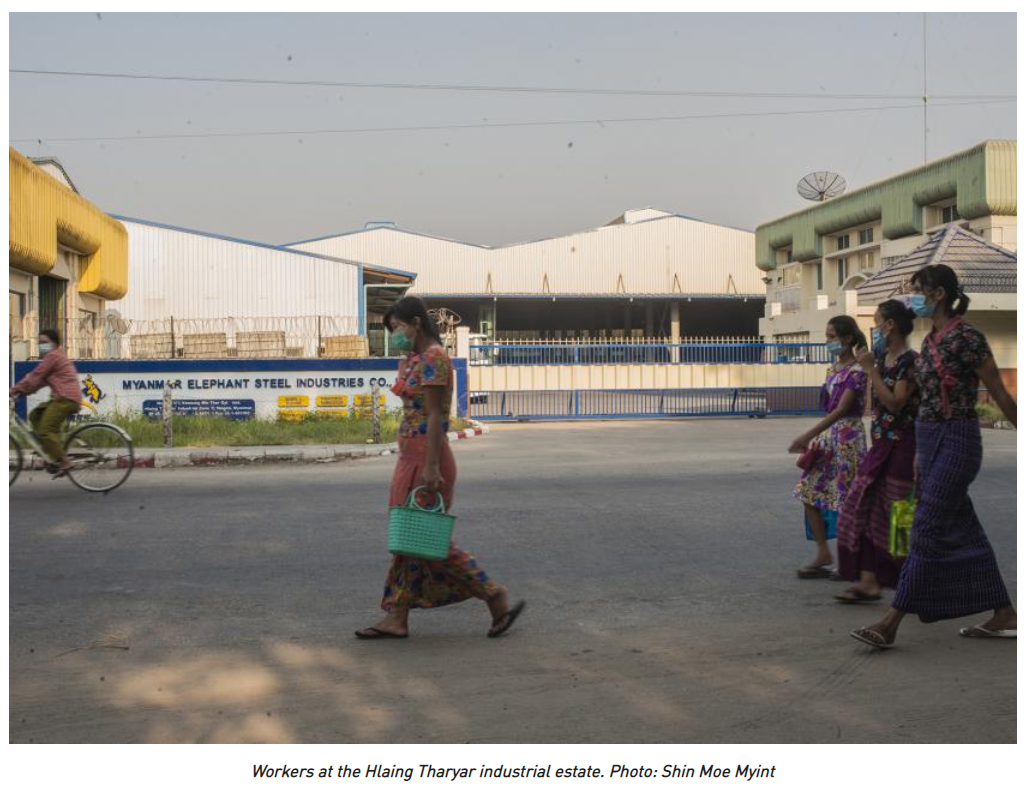Myanmar: More clarity, coordination between ministries needed for COVID-19 policymaking
Last minute government instructions for factories and workplaces to close for COVID-19 inspections have scrambled business plans and caused disruptions to production, underscoring the need for more coordination and communication between the two parties.
After an unusually quiet Thingyan holiday, businesses in Myanmar were expecting work to resume on April 20. But at 8pm on April 19, the Ministry of Labour, Immigration and Population announced that factories would be required remain closed to go through mandatory government inspections between April 20-30 before resuming businesses.
State Counsellor Daw Aung San Suu Kyi also reprimanded several factories in Yangon that were still open on April 22, saying action would be taken against the factories in accordance with the law.
While businesses say strict measures in combating the spread of COVID-19 are necessary, the vague and last-minute notifications adds to the difficulties most are already facing in the current economic downturn.
“Announcing such policies at 8 pm a day before we resume business only sent us into chaos,” a country head for a Taiwanese footwear manufacturer with over 1000 employees told The Myanmar Times on condition of anonymity.
The main problem faced by factory owners is dealing with workers’ salaries during the period of closure. The government’s notice did not include details or recommendations on whether the salaries should be paid.
U Win Shein, director of Yangon’s Capital Legal Counsel, which consults both local and foreign businesses, told The Myanmar Times that Nay Pyi Taw did not make a clear decision on the matter.
“Who should pay the employees at the time of temporary closure? Is it the government, individual businesses, or no pay at all?” he said, adding that businesses appear to be left to deal with these problems on their own.
The uncertainty over how long businesses should remain closed for is also a concern for manufacturers.
“Temporary closures for factories lasting less than a week is bearable as long as the production catches up later on. However, if the shutdown extends to weeks or more than a month, the damage on the business is substantial,” said Seo Won Ho, chair of the Korean Garment Association. He also owns a garment company, Golden Sunshine, with 1600 employees.
“Myanmar’s economy is in a very dangerous situation now…Because if we don’t deliver on time or delay for more than a month, buyers will cancel their orders,” Mr Seo cautioned, adding that many factories would have no choice but to shut down if cancellations happen.
As the government strives to come up with policies to prevent the spread of the virus, notifications by relevant authorities often lack details or contain incoherent instructions, resulting in a state of confusion among employers and the public.
Dr Khin Maung Oo, general secretary of Myanmar Industries Association said this demonstrates a lack of consultation between various stakeholders and the different ministries before the directives are issued. There is also a lack of coordination between the ministries.
“Some of the notifications are even in conflict with others,” he said. For example, shortly after the labour ministry issued the notification for factories to close, the Mandalay chief minister contradicted it by ordering all food manufacturing industries to continue operations on April 20.
An International Growth Centre (IGC) report in April examining Myanmar’s policy response on COVID-19 highlighted coordination issues as “potential significant barriers” to effective policy-making and implementation.
Government ministries and departments are “highly siloed and not used to working together”, while Nay Pyi Taw’s policies have difficulties translating to the local township level, it said.
Going forward, U Aung Hein, an IGC analysts, emphasised the clarity of messages that is critical at all three levels of government, ranging from union, state and region, and township.
“There are now dedicated COVID-19 response committees at each of these levels and these should be used to help coordinate consistent messages from each level,” he said.
U Win Shein agreed, saying: “There should be one authority that coordinates responses from different ministries and releases the information instead of allowing each department to issue directives on their own, he said.
Source: https://www.mmtimes.com/news/more-clarity-coordination-between-ministries-needed-covid-19-policymaking.html


 Thailand
Thailand




